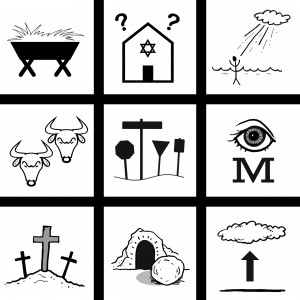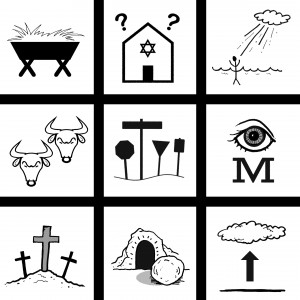 Next, Jesus launched His ministry by prayerfully selecting twelve disciples, or followers. These twelve devoted men would live and learn with Jesus over the next three years. He would teach them, laugh with them, and warn them of His impending death on the cross.
Next, Jesus launched His ministry by prayerfully selecting twelve disciples, or followers. These twelve devoted men would live and learn with Jesus over the next three years. He would teach them, laugh with them, and warn them of His impending death on the cross.
During this ministry, Jesus mingled with people from all walks of life. In one story, Jesus interacted with a prominent council member named Nicodemus who wanted to become part of God’s kingdom. Jesus told him that “God so loved the world, that He gave his only begotten Son, and whoever believes in Him should not perish but have eternal life.”
One day Jesus met a Samaritan woman who was gathering water at a well. He engaged her in a conversation about how God wanted people from all backgrounds to experience His love and forgiveness. He offered her a fountain of living water that would continually supply her with purpose and significance.
He met and healed a sickly man whose friends had lowered him through the roof of a building where Jesus was teaching. Jesus healed him physically, but emphasized that He had also forgiven the man his waywardness from God.
The New Testament shows Jesus welcoming children into his arms. He met with socially outcast men and women. He offered a second chance to a woman caught in adultery. He lovingly befriended a local scoundrel and tax collector named Zacchaeus. The man was so impacted by Christ’s friendship that he accepted God’s forgiveness and joyfully paid back those he had cheated with interest.
Jesus painted a vivid picture of God’s desires. He told everyone that the Father wanted them to love Him with their heart, soul, and mind. Secondly, God wants His children to love one another selflessly. Jesus took his friends Peter, James and John up to a mountain and revealed Himself as the Son of God. They recorded that Jesus’ face glowed brilliantly like the sun and his clothes became as white as light.
Jesus went up on a hill and taught a stirring and practical message to a large crowd. This “Sermon on the Mount” outlined God’s wisdom about life. He showed others how faith in God can free one from worry, greed, boredom, and self-centeredness. He also showed people how to reorder their heart and pray authentically. He taught them a model prayer that says, “Our Father in heaven, Hallowed be Your name. Your kingdom come. Your will be done. On Earth as it is in heaven. Give us this day our daily bread. And forgive us our debts, As we forgive our debtors. And do not lead us into temptation, But deliver us from the evil one. For Yours is the kingdom and the power and the glory forever. Amen.”
Jesus taught others that He came to fulfill God’s law, not abolish it. Jesus masterfully explained the intent of God’s law as evidence that we can never fully earn our way to forgiveness. While many thought they could keep the law through a series of religious rituals, Jesus showed how far we all fall from God’s standard. He said, “You heard it said, ‘Do Not Murder’, but I tell you that anyone who hates his brother has murdered him in his heart. You have heard ‘Do not commit adultery,’ but I say that if you look at a woman lustfully, you have committed adultery with her in your heart. You may have heard, ‘Keep you solemn promises,’ but I tell you to always speak honestly, letting your yes be yes and your no be no.” Jesus tells us to judge others the way we want to be judged.
Jesus was revealing that the source of wrongdoing is rooted deep in the human heart. If we see the fruit of deception, unkindness, impatience, or ingratitude coming from our lives, we need to trace it back to the root. He told us that “out of the heart, the mouth speaks.” Jesus exposed the heart’s sickness by revealing every human being’s inability to keep God’s law. He taught that we should “do unto others as you would have them do unto you”; however, Jesus revealed that no one ever consistently practices this common sense ethic. Jesus also reveals the inadequacy of good works, showing that they are usually motivated by pride, selfishness, and a desire for status. He notes that people often “give” financially to impress people. They pray publicly to bring attention to themselves. They practice spiritual habits in an attempt to manipulate God into blessing them. Jesus offered the remedy to that sickness: God offers to forgive anyone who admits they fall short. He offers to change us from the inside out. He offers to cleanse our hearts so that the fruits of our lives can grow from a new root: freely given forgiveness and a right standing with God.

Jesus’ teachings and ministry can be divided into three sections: Parables, Signs, and “I Am” statements. This section’s icon depicts a “pair of bulls,” or parables. (No, Jesus did not talk about two male cows, but he was a moooving speaker 🙂 He taught parables — earthly stories with a heavenly meaning. Some of His many parables talked about God’s love for those who didn’t know Him. Jesus constantly reminded people that God wants people to look up, not measure up, for forgiveness. Jesus said, “Those who know they need forgiveness are like the sick who seek treatment from a doctor. Those who think they are ‘good enough’ don’t realize they need forgiveness and die from an undiagnosed disease. Jesus’ parables repeatedly showed that the works-oriented “religious” people were more blind than the non-religious people.
Jesus constantly taught stories about God’s pursuing love. He showed us God’s joy in welcoming new people into His family. God’s joy was like the excitement of finding a lost coin, a lost sheep, or a lost son. Jesus taught that God’s kingdom is like a lavish dinner party where everyone is invited! Jesus revealed the history of mankind’s rebellion with a story of a landowner who sent his own son to the land renters, only to be killed by them.
Jesus taught parables about helping others and loving enemies. He taught about a Good Samaritan helping his cultural enemy while the religious leaders ignored his pain. Jesus taught us to forgive by telling a parable of a king who forgave a multi-million dollar loan to a man. The same man who had been forgiven millions ran into a friend who owed him pennies. Rather than paying forward his forgiveness, this man threw the debtor in prison over a few cents. In the metaphor, Jesus explains that we owe a massive debt to God, yet He is willing to forgive it if we merely look up, rather than try to measure up. When we discover that God will forgive our “billions,” we can dismiss the “pennies” owed us by our friends and neighbors.
Jesus taught us to approach God according to His graciousness, rather than our demands, in a parable about laborers in the vineyard. Those who humbly approached God in grace receive far more than those who try to “make a deal” and earn their cut.
Jesus’ parables were designed to make the truths of the kingdom memorable. Each one taught something about God, something about the pain of rebellion, and something about the blindness of religion. Jesus offers righteousness, or right standing with God, that comes from what God does for us, not by what we earn by our works.

Matthew, Mark, Luke and John speak of Jesus’ supernatural miracles. John called them “signs.” A sign points to something greater than itself. John shows that the signs of Jesus revealed His true identity as the divine God, not merely a teacher or philosopher. Each of these signs showed Jesus’ mastery over some aspect of creation. Jesus wanted everyone to “look up to Him for forgiveness.” These signs also serve as claim support for His declaration that “no man comes to the Father, except through Me.”
Here is a live teaching of Fast Track (Matthew-John):
For a free session of Godonomics, visit: http://www.godonomics.com/watch-session-5

